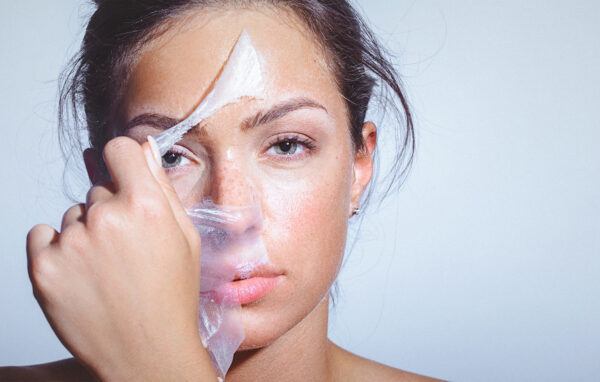Chemical Peels
Chemical Peels
What is a chemical Peel?
A chemical peel is a cosmetic procedure used to improve the appearance and texture of the skin. It involves the application of a chemical solution to the skin, which causes exfoliation and peeling of the outermost layers. This process stimulates skin cell turnover and promotes the growth of new, healthier skin.
Chemical peels can be classified into three main types based on their depth of penetration: superficial, medium, and deep. Each type of peel targets different skin concerns and conditions. Here are some of the common skin conditions treated by chemical peels:
Acne and acne scars: Chemical peels can help reduce acne breakouts and improve the appearance of acne scars by exfoliating the skin and promoting cell regeneration.
Hyperpigmentation: Chemical peels are effective in treating various forms of hyperpigmentation, including sunspots, melasma, and post-inflammatory hyperpigmentation.
Uneven skin tone and texture: Peels can help smooth out rough skin texture and improve overall skin tone, resulting in a more even complexion.
Fine lines and wrinkles: Chemical peels can help diminish the appearance of fine lines and wrinkles, particularly those caused by sun damage and aging.
Sun damage: Peels can effectively target sun-damaged skin, reducing the appearance of sunspots and improving skin texture.
Who are chemical peels performed?
The procedure for a chemical peel typically involves the following steps:
Cleansing: The skin is thoroughly cleansed to remove any dirt, oil, or makeup.
Application of the chemical solution: The appropriate chemical solution is applied to the skin using a brush, sponge, or cotton pad. The type and strength of the solution used depend on the desired depth of the peel and the specific skin concerns being addressed.
Peeling process: The chemical solution is left on the skin for a specific duration, allowing it to work and exfoliate the skin. During this time, you may experience a mild tingling or stinging sensation.
Neutralization (if required): For certain peels, a neutralizing agent may be applied to stop the chemical reaction and balance the pH of the skin.
Post-peel care: After the peel, your skincare professional will provide you with specific post-procedure instructions. These may include guidelines for cleansing, moisturizing, sun protection, and the use of any prescribed skincare products.
Who should I take care of my skin after a chemical peel?
Post-procedure instructions for chemical peels may include:
Gently cleanse the skin using a mild cleanser recommended by your skincare professional.
Apply a moisturizer to keep the skin hydrated and promote healing.
Protect the treated area from sun exposure by applying a broad-spectrum sunscreen with an SPF of 30 or higher.
Avoid direct heat, such as saunas, hot showers, or excessive sweating, for a few days following the peel.
Avoid picking, scratching, or exfoliating the peeling skin to prevent complications and promote proper healing.
Follow any specific instructions provided by your skincare professional, such as avoiding certain skincare products or medications.
It’s important to note that the specific post-procedure instructions may vary depending on the type and depth of the chemical peel performed.
What are common types of chemical peels?
What are some of the popular Chemical Peel Brands?
There are several popular brands that offer chemical peels, each with their own formulations and strengths. Here are some well-known brands in the field of chemical peels:
Obagi: Obagi offers a range of chemical peels designed to address various skin concerns, including hyperpigmentation, acne, and signs of aging.
SkinCeuticals: SkinCeuticals provides chemical peels that target specific skin concerns such as uneven texture, fine lines, and hyperpigmentation.
PCA Skin: PCA Skin offers a variety of chemical peels formulated to address various skin conditions, including acne, sun damage, and aging.
Glytone: Glytone is known for their glycolic acid-based peels, which help improve the appearance of fine lines, wrinkles, and uneven skin tone.
VI Peel: The VI Peel is a popular brand that offers a blend of acids, vitamins, and minerals to address various skin concerns, including acne, hyperpigmentation, and signs of aging.
NeoStrata: NeoStrata provides a range of chemical peels formulated with alpha hydroxy acids (AHAs) and polyhydroxy acids (PHAs) to improve skin texture, tone, and clarity.
Jan Marini: Jan Marini offers chemical peels that target acne, hyperpigmentation, and aging concerns, utilizing a combination of acids and other active ingredients.
Dermaceutic: Dermaceutic offers a range of professional-grade chemical peels that target various skin concerns, including acne scars, hyperpigmentation, and photoaging.
It’s important to note that the availability of specific brands may vary depending on your location and the skincare professionals or dermatologists in your area.
When considering a chemical peel, it’s advisable to consult with a qualified skincare professional or dermatologist who can assess your skin condition and recommend the most suitable brand and peel type for your specific needs and goals.
ready to take the first step towards revitalized skin
Schedule a consultation with our expert team to discuss the best treatment options for your needs.



